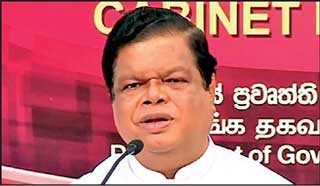Saturday Feb 21, 2026
Saturday Feb 21, 2026
Friday, 22 May 2020 00:00 - - {{hitsCtrl.values.hits}}
The Government yesterday suspended the Rs. 5,000 allowance for June following a letter sent by the Elections Commission (EC), requesting that its impact on voters and Parliamentary Elections be evaluated.
 |
Cabinet spokesman
|
Cabinet spokesman Bandula Gunawardena said the Government had made extensive efforts to pay the Rs. 5,000 allowance to over 5.4 million people despite the serious pressure it placed on a cash-tight Treasury. He acknowledged that the Government struggled to raise the funds for the allowance payment in May as public revenue had plummeted due to the COVID-19 outbreak but had still forged ahead as it was considered as an important need for the poor.
“In April, payment of the allowance cost Rs. 25-Rs.30 billion of public funds. In May, as the Treasury did not have sufficient funds to repeat this effort, Prime Minister Mahinda Rajapaksa presented a new Cabinet paper to raise Rs. 16 billion by other means. The Cabinet paper requested Cabinet approval to give the Treasury Secretary the authority to use the savings deposits of the Samurdhi Authority kept at the People’s Bank and Bank of Ceylon to raise Rs. 16 billion as a short-term loan from a bank. The Treasury Secretary was also given the authority to hold discussions with banks to raise this money and then later repay it through a special allocation,” Gunawardena said.
The Cabinet spokesman stated that the Government was going to such extraordinary lengths to pay the allowance as an act of good faith, and casting the measure as an effort to gain votes was grossly unfair. However, the EC’s letter, which was read out by Gunawardena at the press conference, did not expressly call for the suspension of the payment but simply highlighted how it could be seen as a political tool and requested that Government officials engaged in its distribution be withdrawn. The EC also called for the Government to evaluate the necessity of continuing the allowance at a time when the country was returning to normalcy.
“The allowance was paid to people who were in need. It included Samurdhi beneficiaries, pensioners, differently-abled people, farmers and fishermen. In fact over 6,000 people were added to the list after their cases were considered through an appeal process. The Government has genuinely worked to make this an inclusive process, and therefore it is unreasonable for the EC to consider this something aimed at drumming up votes,” he added.
The Government nonetheless would follow the directives of the EC, Gunawardena noted.
“When the Commission’s letter was discussed by Cabinet, it was the collective view that it would be difficult not to frame this allowance in a non-political light, even though that was not our intention when giving it. The public needs to understand that this is not money from the President, Prime Minister or Cabinet. It is taxpayer funds that are being utilised because of dire necessity.”